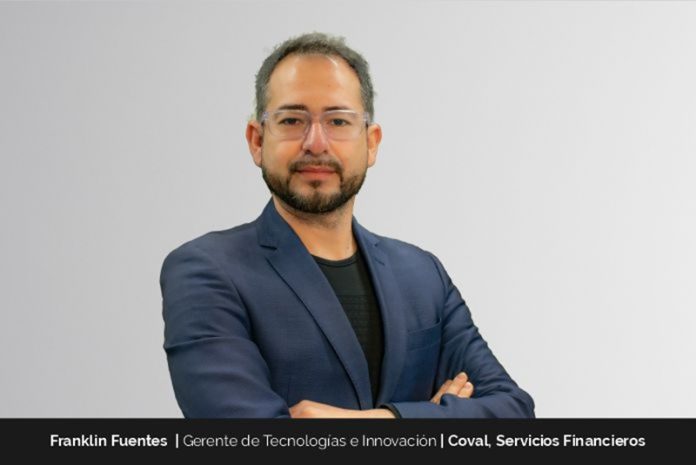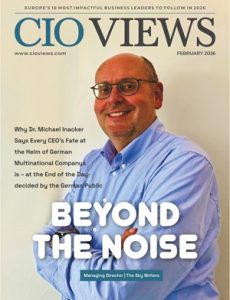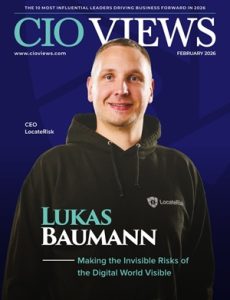Technology has always been more than just circuits, codes, or systems. It’s a bridge that connects vision with reality, innovation with impact, and ambition with purpose. In the right hands, it can transform industries, empower communities, and improve lives. For Franklin Fuentes, technology is exactly that: a tool to create meaningful change and a catalyst for progress.
As the Technology and Innovation Manager at Coval Financial Services, Franklin brings a rare blend of technical expertise, leadership, and human-centered vision. With solid experience leading complex technological projects, he defines himself as dynamic, responsible, and creative who is driven by excellence and motivated by the achievement of shared goals.
Franklin’ journey into technology began unusually early. At just eight years old, he discovered his parents’ Atari 800 XL and a programming manual. Typing his first lines of code, “Hello, world!” ignited a fascination that shaped his future.
Through school and later multiple universities, Franklin immersed himself in technology, auditing, finance, and administration. He continually updated his expertise, including advanced programs at MIT Professional Education and in artificial intelligence.
His career started at 18 in healthcare technology, where he spent seven years seeing how digital tools could improve lives. He later moved into the public sector, worked in control and auditing, and then moved into social programs driven by the belief that technology is more than a tool; it’s a catalyst for impact.
Drawn to finance, Franklin eventually joined Coval Financial Services as Technology and Innovation Manager. There, he applies his expertise to help businesses secure liquidity and grow. Across every stage of his journey, his mission remains the same: harnessing technology and innovation to create meaningful change.
Leadership Forged Through Resilience
Franklin credits much of his leadership philosophy to his roots in Chile, where family values, studies, and life experiences shaped his principles. He believes resilience has been the defining trait: an ability not just to withstand challenges but to learn from them. It is this resilience that prepared him to step into leadership roles at pivotal points in his career.
His philosophy is not fixed but adaptive, molded by circumstances and the needs of his teams. In other moments, he has leaned on a more technocratic style, prioritizing technical expertise and efficiency to make fast, strategic decisions.
Currently working in Chile, Peru, and most recently Colombia, Franklin has developed a leadership vision that transcends borders. Each country, with its own challenges and opportunities, has reinforced his belief that leadership is based on vision, adaptability, and impact.
At its core, his leadership is people-centered. Whether guiding a team of engineers, collaborating with stakeholders, or driving innovation within Coval Financial Services, Franklin focuses on shared vision and collective success. His journey reflects a simple yet powerful conviction: technology can change lives, but it takes resilient, adaptable leadership to ensure it truly makes a difference.
Significance of Technological Improvement at Coval
When Franklin stepped into his role at Coval Financial Services, one of his top priorities was reshaping how technology was perceived. What was once a back-office function has become a strategic pillar of the business. With strong backing from Coval’s leadership, Franklin helped drive the belief that digital transformation is not the task of a single department but of the entire organization. “This requires teamwork, otherwise it’s impossible,” he reflects. His most lasting impact has been fostering a culture where innovation and technology are central.
A clear example is Coval’s proprietary platform, built on the company’s industry expertise. It streamlined operations and turned data into a commercial asset, enabling Coval to anticipate trends, personalize offerings, and design new business models. “What we’ve built is more than a platform,” Franklin explains. “It’s a culture that values technology, adapts quickly, and delivers real value for clients.” This shift has given Coval agility to expand services, strengthen loyalty, and position itself as an industry leader. Crucially, data is now used not just to monitor processes but to predict, optimize, and uncover new opportunities.
Still, Franklin finds that technology alone is not the full story. “Employees are the key players,” he says. “They’re the ones who make transformation succeed by embracing change, driving efficiencies, and opening doors to new possibilities.”
Innovation with Financial Tradition
In the financial services sector, trust is the foundation on which everything rests. Coval, like many firms, faces the challenge of modernizing legacy systems without undermining that trust.
Franklin frames it as a strategic dilemma: reinvent completely, or integrate gradually? A full system overhaul can deliver highly customized solutions but often comes with prohibitive costs and long implementation times. More often, the most effective path lies in integration while ensuring old and new systems work seamlessly together while building the company’s internal adaptability.
He highlights that innovation must be deliberate. At Coval, ideas are evaluated through a rigorous matrix that weighs technology maturity, usability, cost efficiency, integration potential, and business performance. This ensures that every decision balances ambition with practicality, minimizing risks while maximizing value, while uptdating our technology roadmap.
For him, the greatest lesson is that transformation isn’t a one-time project but a continuous capability. “The real strength of a company,” he explains, “is not in choosing between tradition and innovation, but in building the adaptability to thrive in a constantly changing environment.”
From Personal Goals to Collective Impact
According to Franklin, the meaning of success has never been tied to titles or accolades. Instead, he frames it simply: success is about being happy. Yet, he admits, happiness is fleeting, which is why he believes true professional fulfillment comes from setting new goals that generate lasting impact.
Early in his career, Franklin found that sense of purpose in the healthcare sector. One of his first major achievements was leading the transformation of a hospital’s radiology system from analog to digital. The change was not just technological; it meant faster results, better diagnoses, and ultimately, the possibility of saving lives.
Later, within a public agency, he helped design systems that safeguarded citizens’ constitutional rights and ensured benefits were delivered transparently and fairly. For Franklin, these projects reinforced a lesson he carries to this day: success isn’t about crossing a finish line; it’s about outcomes that positively touch lives and stand the test of time.
Today, in his role at Coval Financial Services, Franklin defines success as empowering his team and driving the company toward creating financing solutions that fuel sustainable business growth. He sees the ripple effect clearly: when businesses thrive, they create jobs, drive economic development, and contribute to a more equitable society. “True success,” he reflects, “is when purpose and results walk hand in hand.”
Turning Chaos into Opportunity
Among the defining moments of Franklin’s career was stepping into a public agency that was, in his words, in “systemic chaos.” Technologically outdated, culturally fragmented, and administratively unstable, the organization was at risk of failing in its mission while jeopardizing services that impacted citizens across the country.
The pressure was immense. With little time and high stakes, walking away would have been easy. But Franklin chose a different path. His commitment to purpose and his belief in the impact of public service drove him to confront the challenge head-on.
What followed was a test of resilience and teamwork. He leaned on collaboration, recognizing that leadership doesn’t mean having all the answers; it means knowing when to ask for help and how to unite people behind solutions.
Balance Through Purpose
For Franklin, balance is not about drawing rigid lines between work and personal life. Instead, he sees it as a reflection of how well both worlds align. At the center of his approach lies a simple but powerful pillar: purpose.
He often returns to three guiding questions, which are “Why do I work?” How do I contribute through my work? Where am I working? Because, for him, balance comes naturally when professional responsibilities complement personal values. “If the company’s values align with mine,” he explains, “work doesn’t feel like a burden, but like a meaningful contribution.”
Franklin also believes balance is a shared responsibility. Teams, he says, thrive when leaders foster motivation, collaboration, and shared values. This idea extends beyond the office. Family remains his first priority, but he emphasizes that equilibrium comes from collective understanding and it happens when friends, family, and colleagues recognize the purpose behind his work. In his words, “balance happens when every part of life nourishes the other.”
The Future of Technology in Latin American Finance
Looking ahead, Franklin is convinced that technology will play a decisive role in shaping the financial services landscape across Latin America. He sees three transformative forces leading the way: accessibility, data intelligence, and strategic collaboration.
- Democratizing Access to Financing: With tools like Open Banking, financing will become simpler, faster, and more personalized for individuals and businesses alike. Emerging technologies, from digital wallets to virtual currencies, will not only increase variety but also break down geographic and demographic barriers, fostering greater financial inclusion across the region.
- Harnessing the Power of Data and AI: Franklin views data intelligence and artificial intelligence as the engines of the future.
- Collaboration and Regulation: To fully realize the potential of technology, Franklin emphasizes the importance of collective action. Stronger partnerships between industry players and the government, along with forward-thinking regulation, will create a fair and transparent environment for innovation and combating organized crime.
In his view, advancing technology and regulation in tandem is essential to ensure that financial services remain inclusive, competitive, and sustainable across Latin America.
Shaping the Next Generation of Tech Leaders
For Franklin, mentoring is not about instruction, but about awakening purpose. As Technology and Innovation Manager at Coval Financial Services, he sees leadership development as a twofold responsibility: nurturing individual talent within his organization and creating ecosystems of impact beyond it.
Inside Coval, he blends coaching and mentoring to help each team member uncover their motivations and align them with the company’s goals. “They’re not just part of a technological process,” he often reminds them, “they’re part of the solution that has a real impact.” He points to Coval’s financing ecosystem as an example.
Outside the company, his focus shifts to collaboration. He values exchanging ideas with peers and building alliances across industries. To him, the responsibility of a technology leader extends beyond one organization; it means driving sector-wide development, forging platforms and infrastructures that foster innovation at scale.
The leaders of tomorrow, Franklin asserts, will need a holistic vision, a focus on people, and an unwavering adaptability but above all, the courage to dream and the discipline to make those dreams real.
While resilience, autonomy, and teamwork remain essential, what truly sets a leader apart is creativity paired with execution. “The ability to dream and achieve is what differentiates us, even from artificial intelligence,” he says. Alongside strengthening skills in finance, technology, and administration, he urges aspiring leaders to study sustainability, regulation, and social issues, because these broader perspectives sharpen the ability to anticipate needs and identify opportunities.
A Long-Term Vision
Franklin admits there’s no formula for balancing short-term gains with long-term impact. Instead, he describes it as a constant act of adaptation while maintaining the pace of roadmap execution; a discipline to keep both realities in tension. “Companies are alive, like living organisms,” he reflects. “Some thrive in times of crisis, others stagnate when things seem comfortable. The true art of leadership lies in navigating these cycles.”Franklin’s long-term vision begins with purpose, answering the fundamental questions: Who are we? Who do we want to be? This vision becomes the compass, guiding leadership decisions even through shifting market dynamics. Yet, he acknowledges, ambition alone is not enough. Long-term strategies must be sustained by short- and medium-term results that build trust, commitment, and solvency along the way.
At Coval, this balance takes the form of pursuing intermediate efficiency gains while steadily advancing toward more ambitious goals. If results are not achieved, Franklin sees it not as failure, but as a signal that the vision must be adjusted. Renewal, he argues, is just as important as perseverance. “All goals must be updated or renewed,” he cautions. “Otherwise, even when we’ve reached them, we risk becoming stagnant.”
The Legacy of Purposeful Innovation
Franklin envisions a legacy that transcends balance sheets and quarterly metrics. For him, the measure of innovation is not simply ROI or market competitiveness, but the social impact it generates. At Coval Financial Services, and across the broader financial and technology sectors, his mission is to prove that innovation done with purpose creates ripples far beyond corporate walls.
Franklin believes the financial world is uniquely positioned to drive this change. As he sees it, when companies invest in innovation, they create a virtuous cycle: competition accelerates, new services and products emerge, customers benefit from lower costs and faster results, and new jobs are born while fueling national development. “The economy drives the world,” he notes, “and finance has the power to make that drive more equitable, efficient, and sustainable.”
Franklin sees building this legacy requires more than just innovation as it demands collaboration. He argues that the financial industry must take a bold step toward fostering a sustainable, interconnected economy. That means encouraging accessibility and secure information-sharing between the public and private sectors. He hopes to leave behind more than professional accomplishments; he wants to leave proof. Proof that technological innovation, when applied with integrity and foresight, is not just a tool for growth but a catalyst for security, prosperity, and development. His vision is clear: a financial sector that uses technology not only to build stronger businesses but also to build stronger societies. That, he believes, will be his enduring contribution.





